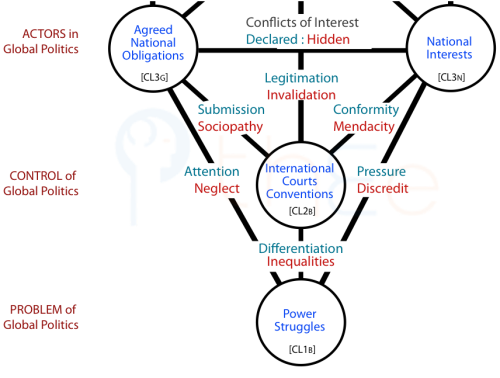Global Power Struggles (CL1)
International Politics
International politics seems to be about each government purposefully using any and all instruments of power that it possesses to ensure the security, often an absolute security, of its society and its territory.
Countries differ, and their place in the power hierarchy depends on factors like:
- physical size
- geographic features
- economic strength
- population size
- demographics.
Expansionist traditions, moral resources, cultural differences and commonalities with other nation-states may also affect the recognition of friends and enemies. Language often plays a role.
Is Power All that Counts?
Given that all nations necessarily have interests and naturally exert power to pursue them, the result is a () — the same power struggle that characterizes politics within any frame of reference. So, no surprises there!
International stability means a stable «balance of power», with violence confined to small peripheral wars and civil wars. This is similar to stability within societies based on its social structure.
The reality of must not be denied: they are not a problem. It is when turn into overt or covert violence, war or crimes, that politics ceases. Then humanity, i.e. each and every person, has a problem.
has been sought via , but its genuine use is weak in the face of intransigent power.
Geopolitics & Grand Strategy
Political theory fails to represent political life in much the same way that economic theory fails in regard to economic life. Nevertheless, geopolitical theory, with its notion of «grand strategy» built around the deployment of coercive power, currently dominates government thinking around the world. makes it natural for politicians to keep citizens in the dark and feed them propaganda and blatant lies.
The fraudulent justification of the Iraq invasion by the USA is typical, but there is no reason to focus on American Presidents when it comes to lying to the public.

Grand strategy is typically directed in secrecy by the political leadership, with input from the military top brass. It is hard-headed, rational and largely independent of the personalities involved.
Security issues are conceived as primarily driven by geographical and cultural realities, in the context of historical events flowing from them. Similar patterns of conflict may be seen to repeat over many centuries.
So the grand strategy acquires the sense of rightness that comes with science and hard data methods. The fact that the effect may be to sabotage solutions or spark a downward spiral of trust is neither here nor there.
Although international activities are a matter of public record, the details of implementation and the precise reasons for decisions are invariably concealed—«for reasons of national security».
Glorious isolation might seem possible—and certain nation-states would like their cultures to remain untouched by contact with others. In practice, mankind shares the atmosphere and the seas, so activities of nation-states impact on each other. People everywhere now get access to a vision of a technologically-advanced way of life that reduces physical labour and they want to share it.
In too many poorer countries, those in governing positions propose self-sufficiency while trading their natural resources and living rather well with a large well-paid military. Meanwhile, the mass of society is allowed to remain in a poor condition.
- Details of the direct influences on global power struggles.
Originally posted: July 2009; Last updated: 12 June 2014.